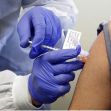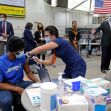As college students across America begin packing for the new fall semester, they typically fill their trunks and suitcases with clothes, blankets, and toiletries. This year, thanks to a ruling by a federal judge, the 90,000 students who will be attending Indiana University (IU) in person will be required to bring proof of their COVID-19 vaccinations as well.
In a 101-page ruling on July 18, U.S. District Judge Damon R. Leichty of the Northern District of Indiana put public health above the ability of students to refuse unwanted medical treatment. He ruled against a preliminary injunction brought by a group of eight students who did not want to get vaccinated and argued that IU had not acted constitutionally when it mandated COVID shots.
The judge’s opinion explained that the preliminary injunction the students sought was “an extraordinary remedy that requires a strong showing” that they will likely succeed on the merits, that they will sustain irreparable harm without an injunction, and that when harm and the public interest are balanced, harm would prevail. Oral argument was held on July 13, 2021.
Judge Leichty ruled that the students failed to meet the requirements for obtaining the “extraordinary remedy” of a preliminary injunction. In denying their motion, he wrote, “The Constitution and longstanding precedent should endure.” He explained that while students do have “significant liberty to refuse medical treatment, the Fourteenth Amendment permits Indiana University to pursue a reasonable and due process of vaccination in the legitimate interest of the public for its students, faculty, and staff.”
He quickly cautioned, however, that his detailed ruling was not a final decision on the merits of the case. “This isn’t a decision after a final trial on the merits,” he wrote. “The court has made this decision based on evidence, testimony, and briefing that the parties produced on an emergent timetable… But not every stone has been unturned by the parties. Not every study has been hashed out or submitted for the court to read. Not every witness has testified, (and) this still is a preliminary record, with an opinion issued urgently given the interests of these parties….”
The petitioning students had many concerns. If not vaccinated, they may not go on campus. In addition, all their accounts, including emails, are suspended. But Leichty pointed out that unvaccinated students had other “real options,” none of which “amount to coercion.” Students could apply for a variety of exemptions, based on criteria such as medical need or religious beliefs. They can wait until Spring 2022, to see what happens, since the ruling only applies to Fall 2021. In addition, they could take classes online, since the vaccination mandate is limited to in-person students. Or they could choose to attend another university.
The students countered that those exemptions were cumbersome since they required those who receive them to wear masks, maintain social distancing, submit to testing, and face possible quarantines if they come into contact with someone who has the coronavirus.
The lawsuit was brought by a group of dissimilar students, all of whom except one had already received exemptions. The court discussed that by permitting exemptions, the University rightfully can dismiss most challenges to its mandatory vaccine policy. Plaintiffs in this case include a 39-year-old graduate student pursuing two doctorates in music who had already received a medical exemption, a 26-year- old incoming law student and five other students who had previously received religious exemptions, and one single student who had not yet applied for an exemption. The students also argued that “herd immunity” has been achieved. IU and its scientific experts disagreed.
The judge’s opinion also explained that IU’s Board of Trustees has the power to “protect the academic community from . . . a serious threat to person or property of the academic community.” He noted that state law already requires all public university students to receive a variety of other vaccinations, including diphtheria, tetanus, measles and mumps. Turning to the laws of other states, he noted that several had recently passed laws that prohibited “vaccine mandates or vaccine passports.” Indiana has passed the latter, but not the former. He outlined the lengthy process IU used to study the issue, including extensive input from medical experts.
He also stated that more than 500 American universities have already mandated COVID-19 vaccinations, although many are private institutions. He cited the recommendation of the Centers for Disease Control (CDC) that urges a return to full capacity only when “all students, faculty, and staff are fully vaccinated prior to the start of the semester.” The Indiana Department of Health agrees with the CDC. He also detailed the procedures that the Food and Drug Administration (FDA) used before approving various vaccines as well as the agency’s extensive and ongoing monitoring of all conditionally approved vaccines.
Another discounted argument by the students was the contention that students, because of their age, are already at low risk of getting the disease. The judge said that current data is inclusive, but some research suggests that campus outbreaks can pose a danger not only to students but to the larger communities in which they are located.
Leichty’s opinion included an extensive treatise on the Fourteenth Amendment as it applies to state actions taken to protect public health. He cited precedents that went back to 1905 that permitted mandatory smallpox vaccinations. He included a great deal of research from doctors, the FDA and the CDC. In doing so, he concluded that “Overall, the students’ arguments amount to disputes over the most reliable science. But when reasonable minds can differ as to the best course of action…the court doesn’t intervene so long as the university’s process is rational in trying to achieve public health.” Here, it was.
The lawsuit against IU is not unique. The University of Connecticut and the 23-campus California State University system currently face similar student challenges to mandatory vaccine policies. In addition, the escalating crisis coming from COVID-19’s Delta Variant already poses new challenges. Leichty’s opinion recognizes this. He wrote, “With ever-evolving COVID-19 science, more will be known tomorrow, next month, and next year; but a courtroom is no place for guesswork.” He understands the need for constant vigilance as well, writing, “As our country and communities progress through a pandemic, the government must continually update its practices in light of the most recent medical and scientific development.”






